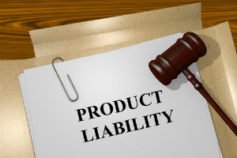
When making purchases, consumers should feel comfortable that they won’t be harmed by the products they buy. One of the greatest benefits of the American civil justice system is that consumers can hold manufacturers liable for dangerous or defective products. This, in turn, helps prevent others from unnecessary harm.
The history of products liability litigation in the United States proves that our ability to hold manufacturers responsible for unsafe products is perhaps the best assurance that manufacturers will do their best to make products safe. For example, the Ford Pinto made headlines during the 1970s because it burst into flames when struck from the rear because of a poorly designed, guarded, and positioned gasoline tank. The dangerous design defects in this vehicle may never have been exposed if not for litigation by owners and their families. These lawsuits held Ford accountable for the serious injuries and deaths of occupants who were burned while riding in a Pinto that was hit from the rear and the car’s gasoline tank exploded.
The Ford Pinto litigation did more than provide compensation to the parties injured or the families who lost loved ones. It uncovered the shocking fact that Ford knew about the risks of serious injury or death from Pinto accidents and chose to do nothing about the risk in order to maximize its profits. A simple design change involving an inexpensive shield could have prevented the deadly fires that resulted in Pinto accidents. Yet Ford made a business decision to do nothing about it and pocket as profit the costs of adding the shield. Ford crunched the numbers and decided that it would be cheaper to defend lawsuits by injured parties and pay settlements and verdicts than to fix the defective cars.
Product liability cases like the Ford Pinto litigation spurred changes in the automobile manufacturing industry. These lawsuits brought to light Ford’s outrageous corporate behavior. Citizen juries made certain that corporations like Ford would think twice before valuing corporate profits over consumer safety in the future. Today, various laws and consumer protection agencies help provide minimum safety, research, and labeling standards with which manufacturers must comply.
Vehicle manufacturers must follow safety standards published by the National Highway Traffic Safety Administration (NHTSA). They are more likely to issue recalls when major problems are identified in vehicles and must notify owners in a timely manner.
State and federal law regulates consumer product safety across non-automobile industries. One such law is the Consumer Product Safety Act (CPSA). Enacted in 1972, the CPSA established the U.S. Consumer Product Safety Commission to help protect and educate consumers. Subsequent amendments to the CPSA have strengthened the government’s ability to monitor product safety and penalize manufacturers of consumer products, which consist of any household products other than tobacco products, motor vehicles, firearms, aircraft, boats, drugs, or food.
The U.S. Food & Drug Administration (FDA) also regulates products which are consumed by, or intended to treat or diagnose, humans and animals. This includes a range of products such as food, drugs, medical devices, cosmetics, veterinary products, or electronic products. Manufacturers that fail to follow these safety laws, or knowingly sell defective products, could be held liable for resulting injuries.
Talk to a Product Liability Lawyer Today
The Sloan Firm’s product liability attorneys understand how product-related injuries can be life-altering and difficult to handle. If you or a loved one has been injured by a defective product, it is important to hire an attorney. You deserve a legal team who understands the complex web of state and federal consumer protection laws.
Our experienced attorneys have vigorously represented plaintiffs in class actions, mass tort, and individual product liability claims. We have helped injured people secure the compensation they deserve. Contact us now to find out more about your best legal options and how we can help you. There is no charge for the consultation.
